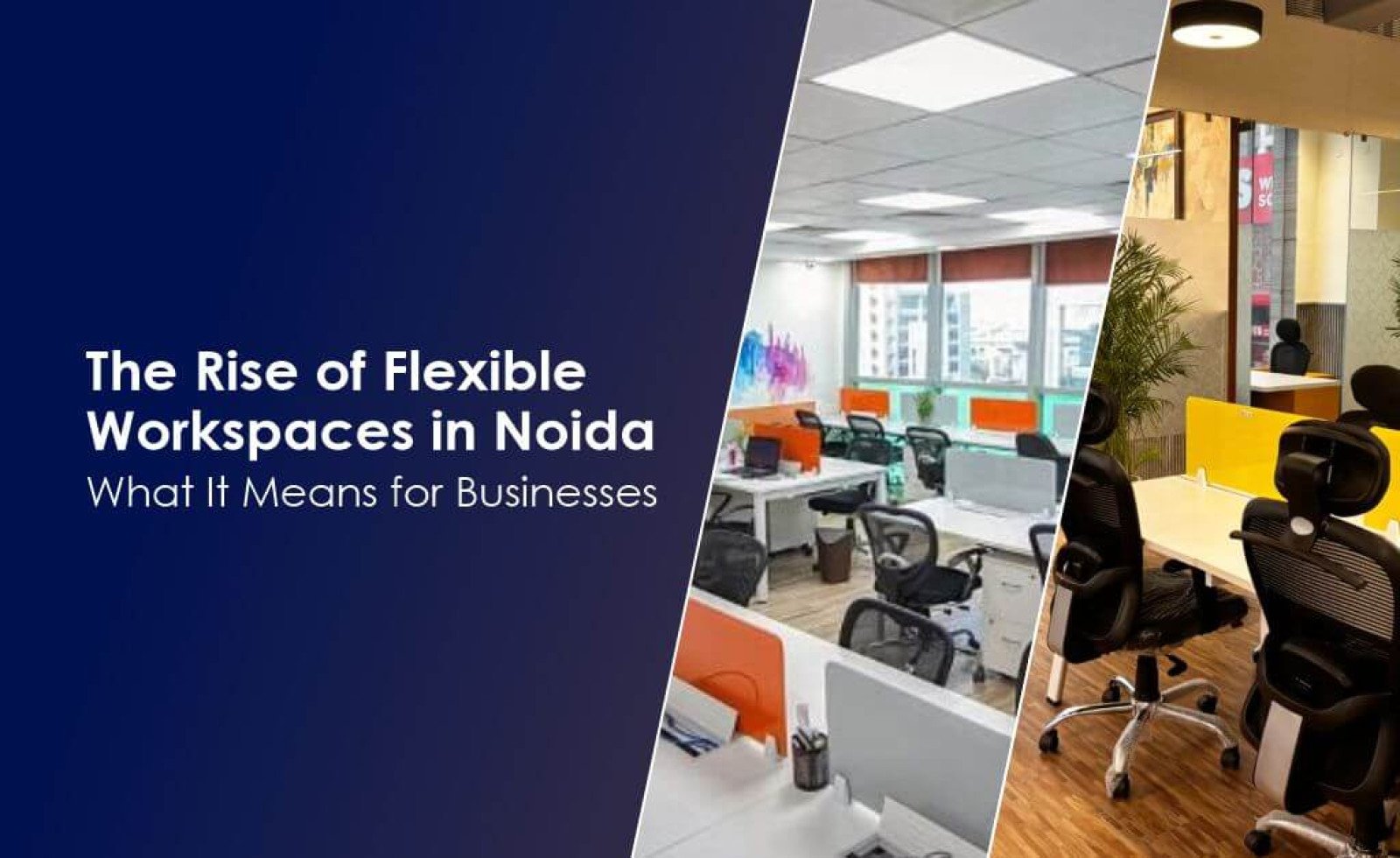The Rise of Flexible Workspaces in Noida: What It Means for Businesses

The Evolution of Noida's Workspace Landscape
Noida, a bustling satellite city in the National Capital Region (NCR) of India, has undergone a remarkable transformation over the past decade. Once primarily known as an industrial town, it has emerged as a vibrant hub for information technology and corporate operations. This shift has paved the way for the proliferation of flexible workspaces, which are redefining how companies operate in the region. These modern setups, offering shared offices, rental office spaces, and managed spaces, have become integral to Noida's economic fabric, attracting a diverse range of enterprises from startups to multinational corporations.
The journey began in the early 2010s when Noida started attracting major IT firms like Microsoft, Samsung, and HCL, drawn by its proximity to Delhi and supportive infrastructure. As remote and hybrid work models gained traction post-pandemic, the demand for adaptable office environments skyrocketed. By 2024, Delhi-NCR, including Noida, saw flexible workspace leasing reach 2.3 million square feet, contributing significantly to India's overall record of 12.4 million square feet in gross leasing volume—a 57.5% year-on-year growth. This evolution isn't just about space; it's about creating ecosystems that foster productivity and growth, setting the stage for businesses to thrive in a dynamic market.
Driving Forces Behind the Surge
Several factors have fueled the rapid ascent of flexible workspaces in Noida, making it a preferred destination over neighboring areas like Gurgaon. At the heart of this surge is the city's strategic positioning and robust infrastructure, which have made it an attractive alternative for cost-conscious companies.
Strategic Location and Connectivity
Noida's connectivity is a game-changer. With seamless access via the Delhi Metro's Blue and Aqua Lines, the DND Flyway, and the Yamuna Expressway, commuting is efficient for employees from across the NCR. The upcoming Jewar International Airport further enhances its appeal, promising global connectivity. These links not only reduce travel time—often just 25-30 minutes to South and Central Delhi—but also integrate Noida into a broader urban network rich with amenities like malls, gyms, and healthcare centers. For businesses, this means easier talent acquisition and retention, as professionals seek locations that balance work and lifestyle.
Government initiatives, such as Make-in-India, have also played a pivotal role by easing business operations and providing reliable power and telecom services. Unlike some regions with stringent local hiring rules, Noida's policies encourage investment in sectors like fintech and electronics, drawing more firms to set up flexible operations here.
Cost Advantages and Flexibility
Affordability is another key driver. Co-working desks in Noida typically rent for ₹4,000 to ₹8,000 per month, significantly lower than in premium Delhi locales. This cost edge, combined with flexible lease terms, allows businesses to scale without long-term commitments. In a post-layoff economy where companies are cautious about overheads, these spaces offer managed solutions that include amenities like high-speed internet and conference rooms, reducing setup costs by up to 30-40%. As India's flexible office space market is projected to grow from USD 5.99 billion in 2025 to USD 11.39 billion by 2030 at a CAGR of 13.72%, Noida's role in this expansion is evident.
Benefits for Businesses of All Sizes
The implications of this rise extend far beyond mere convenience, offering tangible advantages that can reshape business strategies. Flexible workspaces in Noida are not just offices; they're catalysts for efficiency and innovation.
Cost Savings and Scalability
For startups and small to medium enterprises (SMEs), the primary benefit is financial agility. Traditional offices demand hefty deposits and maintenance fees, but flexible options allow businesses to pay only for what they use—be it a single desk or an entire floor. This scalability is crucial in volatile markets; companies can expand during growth phases or downsize without penalties. In 2024, around 38,000 seats were leased in Delhi-NCR alone, reflecting strong demand from sectors like IT-BPM and engineering. Larger corporates, adopting 'Core+Flex' strategies, use these spaces as satellite offices to test markets or accommodate project teams, minimizing risks.
Enhanced Collaboration and Innovation
Beyond costs, these environments promote a collaborative culture. Shared spaces facilitate networking among freelancers, entrepreneurs, and corporate teams, sparking ideas and partnerships. Amenities like communal lounges and event spaces encourage interaction, while integrated technologies—such as AI-driven booking systems—streamline operations. For businesses, this translates to higher employee satisfaction and productivity, especially in hybrid setups where flexibility aligns with modern work preferences. As more firms embrace sustainability, many Noida workspaces incorporate green features, appealing to eco-conscious talent and clients.
Key Players and Innovations in Noida
The landscape is dominated by established operators who are innovating to meet evolving needs. Companies like WeWork, Awfis, Innov8, and 91Springboard have expanded aggressively in hotspots such as Sectors 62, 63, 125, and 135. These players offer customized solutions, from private cabins to enterprise-managed offices, often with add-ons like virtual offices and wellness programs.
Innovations include tech integrations for seamless hybrid work, such as app-based access and virtual reality tours. In the first half of 2025, co-working operators leased 6.5 million square feet across major cities, a 48% increase, underscoring the sector's momentum. Noida's operators are also focusing on community-building events, fostering a sense of belonging that traditional offices often lack.
Challenges and Considerations
Despite the boom, businesses must navigate certain hurdles. Infrastructure strains, like traffic congestion during peak hours, can impact accessibility. Additionally, while costs are low, competition for prime spaces in popular sectors may drive up premiums. Data privacy in shared environments is another concern, prompting firms to seek operators with robust security measures. As the market matures, regulatory changes could influence lease agreements, requiring businesses to stay informed.
However, these challenges are outweighed by opportunities, especially with projections of India's flexible supply hitting 125 million square feet by 2027. Proactive planning, such as partnering with reputable providers, can mitigate risks and maximize benefits.
Future Outlook: What's Next for Flexible Workspaces in Noida
Looking ahead, Noida is poised to solidify its status as the co-working capital of the NCR. With demand surging—driven by hybrid work, GCC expansions, and economic growth—the sector is expected to see continued investment. Trends like AI-enhanced workspaces and sustainable designs will dominate, while expansion into Greater Noida offers new frontiers.
For businesses, this means greater choices and efficiencies, potentially reshaping operational models. As flexible rental workspaces become mainstream, contributing 14% to India's office leasing in 2024, Noida's ecosystem will likely attract more global players, boosting local employment and innovation.
Conclusion
The rise of flexible workspaces in Noida represents a paradigm shift, offering businesses agility in an uncertain world. From cost savings to collaborative opportunities, these spaces are empowering companies to adapt and grow. As Noida continues to evolve, embracing this trend could be the key to sustained success, inviting entrepreneurs and executives alike to explore what this dynamic city has to offer. Whether you're a startup eyeing expansion or a corporation seeking efficiency, the implications are clear: flexibility isn't just a perk—it's the future of work in India.

Please Login to Comments
Login